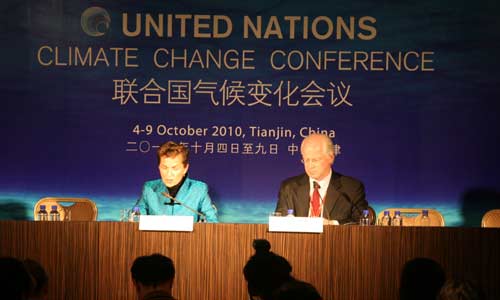UN climate chief calls for 'spirit of compromise'
To make a tangible outcome in the year-end Cancun climate summit, governments need to be flexible and compromise to reach a politically balanced deal, the UN climate chief said Monday in the new round of climate talks held in Tianjin, China.
|
|
|
Christiana Figueres, the UN's chief climate-change negotiator, hosts a press conference of a United Nations Climate Change meeting held Monday in Tianjin, a port city in northern China. [Zong Chao/China.org.cn] |
In her opening speech, Figueres called upon delegates to "Qiu Tong Cun Yi," a Chinese idiom that means "seek commonalities while putting aside differences."
She said that climate-change negotiations need to narrow down the differences and reach more consensuses before the COP16 UN Climate Change Conference in Cancun, Mexico.
"What has been done this year and what will to do in Cancun is setting a foundation for the next chapter of climate regime upon which they will then be built," she said.
She added that there are many lessons to be learned from the Copenhagen climate change conference, which failed to reach a legally binding deal last year, and one of the most important thing is that they can't build a tall building without a foundation.
She said progress has been made during the last negotiation this year in Bonn, Germany, such as the Ad Hoc Working Group on Long-term Cooperative Action under the Convention (AWG-LCA) that drafted a party-driven text, which will serve as the foundation for the Cancun summit.
"What is on the table right now is way too much for Cancun, so the governments need to make choices and be able to decide what's is going to be achievable and a politically balanced package for Cancun and next year," Figueres said.
The climate talks in Tianjin, that go Oct. 4 to 9, are the first time China has held a climate-change conference.
"I'm very impressed by their emission reduction target that cuts carbon intensity per unit of GDP by 40 to 45 percent by 2020 from the 2005 level," she said.
Figueres went on to say that China should take leadership to tackle climate change and be more flexible on this issue.
Also at the conference, Xie Zhenhua, China's top climate negotiator, said China is making a national effort to meet this goal, and hopefully will reach the target of the 11th-five-year plan (2006-2010) by the end of this year, which will cut energy intensity per unit of GDP by 20 percent from 2005.
 0
0 







